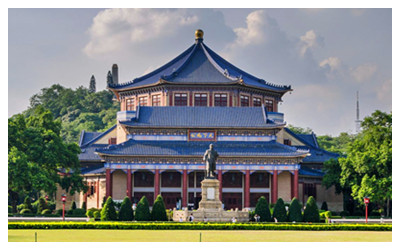Skype: neodalle-travel
Tel: +86 135 7447 2266
E-mail: sales@zhangjiajieholiday.com
 Guangdong Province was for centuries a remote part of the empire, largely ignored by emperors. It was inhabited by the so-called Hundred Yue people, a collection of ancient Yue tribes, most of which have since become assimilated into mainstream Han Chinese society, but who are also believed to be related to, among other present-day ethnic groups, the Zhuang ethnic group of Guangxi Province. The area was under official Imperial-era administration ever since the Qin (BCE 221-207) Dynasty, though, as indicated, it was largely allowed to exist on its own terms. Over time, Han Chinese administration eventually exerted its influence in the area, and most of the Yue peoples living in Guangdong were gradually assimilated into mainstream Han Chinese society, though some were displaced while others remained in small enclaves, as they do to this day.
Guangdong Province was for centuries a remote part of the empire, largely ignored by emperors. It was inhabited by the so-called Hundred Yue people, a collection of ancient Yue tribes, most of which have since become assimilated into mainstream Han Chinese society, but who are also believed to be related to, among other present-day ethnic groups, the Zhuang ethnic group of Guangxi Province. The area was under official Imperial-era administration ever since the Qin (BCE 221-207) Dynasty, though, as indicated, it was largely allowed to exist on its own terms. Over time, Han Chinese administration eventually exerted its influence in the area, and most of the Yue peoples living in Guangdong were gradually assimilated into mainstream Han Chinese society, though some were displaced while others remained in small enclaves, as they do to this day.As a coming territorial part of the Wu Kingdom (CE 229-280) that would soon emerge during the Three Kingdoms (CE 220-280) Period, Guangdong was established as an independent province, Guang Province, already in CE 226. During the Tang (CE 618-907) Dynasty, the surrounding area - to include most of present-day Guangxi and Guangdong Provinces - was reorganized as Lingnan Circuit (a circuit being a political entity of the period). The eastern part of Lingnan Circuit was eventually separated out and given its own administration, Guangnan East Circuit, during the Song (CE 960-1279) Dynasty.
There were major but intermittent periods of migration of Han Chinese people from the north to the south that benefitted the Guangdong area, the first one occurring during the Jin (CE 264-420) Dynasty. Other migrations followed during the Tang (CE 618-907) and the Song (CE 960-1279) Dynasties, as well as during the Jürchen-led Jin (CE 1115-1234) Dynasty, which itself was not particularly popular with the Han Chinese, many of whom fled southward long before the Mongol incursions began (among other unpopular moves, the Jürchens repealed the Han Chinese Imperial Examinations, which had been set up during the Sui (CE 581-617) Dynasty as a replacement for the inefficient and corrupt feudal system of governance based on hereditary lineage).
The Mongol invasion sent fresh waves of Han Chinese people fleeing to safer areas southward, but the Mongols continued to push eastward and southward, conquering all of China in the process, but eventually setting themselves up as regular Chinese emperors, adapting their rule to the majority Han Chinese norms (this adaptive behavior was in fact typical of the Mongols wherever they invaded).
 The Han Chinese poeple who had retreated to Guangnan East Circuit were finally defeated by Emperor Shizu (aka Kublai Khan, grandson of Genghis Khan and who reigned during the period CE 1260-1294) of the Yuan (CE 1279-1368) Dynasty in the Battle of Yamen in CE 1279, and Guangnan East Circuit then became a part of present-day Jiangxi Province. It was first during the Ming (CE 1368-1644) Dynasty that the eastern part of the former Guang Province was re-established as a separate province, Guang East Province, or Guangdong Province.
The Han Chinese poeple who had retreated to Guangnan East Circuit were finally defeated by Emperor Shizu (aka Kublai Khan, grandson of Genghis Khan and who reigned during the period CE 1260-1294) of the Yuan (CE 1279-1368) Dynasty in the Battle of Yamen in CE 1279, and Guangnan East Circuit then became a part of present-day Jiangxi Province. It was first during the Ming (CE 1368-1644) Dynasty that the eastern part of the former Guang Province was re-established as a separate province, Guang East Province, or Guangdong Province.
Guangdong Province would go on to become an important part of China's budding trade with the outside world, and would, unfortunately, become embroiled in the trade conflict between China and several foreign powers, in particular, a trade conflict with Great Britain that would lead to the Opium Wars (1839-1842 and 1856-1860) and the eventual loss of Hong Kong to Great Britain - as well as the loss of Guangdong Province's Macau to Portugal - as part of the so-called Unequal Treaties, under which treaties trade and territorial concessions were forced upon China.
Guangdong Province would also later be the birthplace of the Taiping Rebellion as well as the heartland of the anti-Qing government movement led by the astute politician and military tactician, Dr. Sun Yat-sen, that would eventually bring down the Qing (CE 1644-1911) Dynasty, China's last Imperial dynasty, to be replaced by the Republic of China (CE 1912-1949). It is claimed that with such a rich history of being 'in the center of where things happen', the people of Guangdong Province are natural-born revolutionaries.
 Ask Questions ?
Ask Questions ?